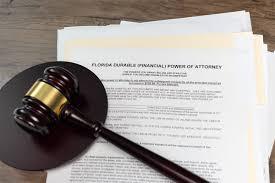Protect Against Power of Attorney Fraud

Granting someone power of attorney (POA) is a significant legal decision that allows another individual, often referred to as an "agent" or "attorney-in-fact," to act on your behalf in financial, legal, or healthcare matters. While the power of attorney can be a vital legal tool, it also carries inherent risks. Without proper precautions, POA can be misused, leading to financial exploitation, fraud, and emotional distress. In this guide, we explore how you can protect against power of attorney fraud and implement effective strategies to avoid POA misuse.
What Is Power of Attorney?
A power of attorney is a legal document that gives someone else the authority to act on your behalf. It is commonly used in situations involving:
-
Financial transactions (e.g., paying bills, managing investments)
-
Legal decisions (e.g., property sales or legal claims)
-
Healthcare choices (e.g., end-of-life care decisions)
POAs can be general, limited, durable, or springing, each with different scopes and conditions. The wide-ranging authority granted under some POAs makes them susceptible to misuse if not carefully managed.
Understanding Power of Attorney Fraud
Power of attorney fraud occurs when the person granted authority acts outside the limits of the agreement or uses the POA for their personal benefit at the expense of the principal (the person granting the power). This could include:
-
Unauthorized withdrawal or transfer of funds
-
Selling or mortgaging property without consent
-
Making decisions that benefit the agent instead of the principal
-
Falsifying records or signatures
Such acts are not only unethical but also potentially criminal, depending on the jurisdiction. Recognizing and addressing these risks early is the best way to protect against power of attorney fraud.
Warning Signs of POA Misuse
To avoid POA misuse, individuals and families should remain alert to common red flags, such as:
-
Unexplained financial transactions
-
Sudden changes in banking or investment behavior
-
Isolation of the principal from friends and family
-
Pressure to sign legal documents quickly
-
Reluctance by the agent to provide financial reports
Often, elderly or incapacitated individuals are the most vulnerable, making them frequent targets for POA abuse by relatives, caregivers, or acquaintances.
Steps to Protect Against Power of Attorney Fraud
Here are concrete steps to safeguard your rights and ensure responsible use of POA:
1. Choose the Right Person
The most critical decision in granting a POA is selecting a trustworthy and competent agent. Choose someone who:
-
Has a history of financial responsibility
-
Understands the legal obligations involved
-
Will act in your best interest
-
Is transparent and communicative
It is also wise to consider appointing co-agents who must act jointly, creating a natural system of checks and balances.
2. Use Limited or Specific POAs
Rather than granting sweeping authority, use a limited power of attorney that defines the scope, duration, and nature of the powers granted. This minimizes the risk of unauthorized actions.
For example, if you only need someone to manage a property sale, specify that transaction only. A narrowly defined POA is much easier to monitor and control.
3. Include Oversight Provisions
To avoid POA misuse, you can include provisions in the POA document requiring:
-
Regular accounting or financial reporting to a third party
-
Notification before major decisions or transactions
-
Dual signatures for large transactions
Legal professionals can draft these clauses to ensure they are enforceable and tailored to your needs.
4. Work with a Legal Professional
Consulting an experienced attorney when drafting your POA ensures that the document complies with your state's laws and offers maximum protection. They can also help you evaluate whether a durable POA, which remains in effect after incapacity, or a springing POA, which activates only under specific conditions, is most appropriate.
A well-drafted POA can be your strongest defense to protect against power of attorney fraud.
5. Keep Copies and Records
Ensure that multiple trusted parties—including your attorney, family members, and possibly a financial advisor—have access to a copy of your POA. Maintain thorough records of all legal and financial transactions conducted under POA authority. This creates a transparent paper trail.
6. Regularly Review and Update the POA
Life circumstances change, and so do relationships. Review your POA annually or whenever there is a significant life event such as:
-
Marriage or divorce
-
Death of the agent or a close family member
-
Diagnosis of a serious illness
-
Relocation to another jurisdiction
Revoking or amending your POA as needed is an essential step to avoid POA misuse in the long term.
Legal Remedies for POA Abuse
If you suspect misuse of a POA, take action quickly. Here’s what you can do:
1. Revoke the POA
If the principal is mentally competent, they can immediately revoke the POA in writing and notify all relevant parties, including banks and legal entities.
2. Report to Authorities
Report the suspected abuse to local law enforcement or Adult Protective Services. Financial exploitation of the elderly or disabled is a criminal offense in many jurisdictions.
3. Seek Legal Action
File a civil lawsuit for damages or request the court to appoint a guardian or conservator. In some cases, you may request a court-ordered accounting from the agent.
Having a legal representative is crucial at this stage to ensure timely and effective action.
Conclusion
Granting power of attorney is an act of profound trust. When managed correctly, it empowers loved ones or trusted advisors to help you in times of need. However, without appropriate safeguards, it can become a tool for exploitation.
To protect against power of attorney fraud, you must take proactive steps—from carefully choosing your agent and drafting a detailed, limited POA, to regularly monitoring transactions and involving legal professionals. By staying vigilant and informed, you can significantly reduce the risks and avoid POA misuse, safeguarding your financial and personal well-being.
- Art
- Causes
- Crafts
- Dance
- Drinks
- Film
- Fitness
- Food
- Spiele
- Gardening
- Health
- Startseite
- Literature
- Music
- Networking
- Andere
- Party
- Religion
- Shopping
- Sports
- Theater
- Wellness



